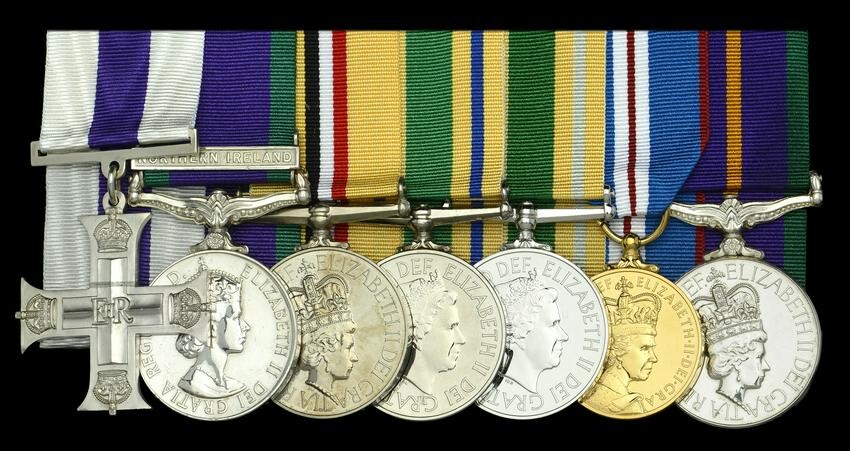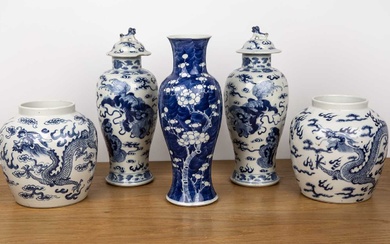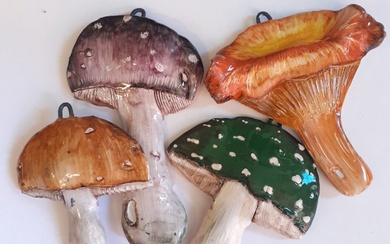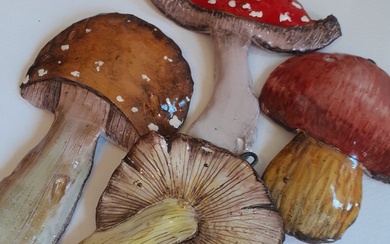Groups and Single Decorations for Gallantry
The superb ‘Iraq 2003’ M.C. group of seven awarded to Corporal A. W. Currie, 1st Battalion, King’s Own Scottish Borderers who, coming under heavy machine gun fire near Al Uzayr security base on the night of 8 August 2003, led his team forward in a prolonged fire fight with over 20 enemy gunmen operating from 5 different positions. Finally assessing his position to be untenable, he called for an illumination round to aid identification of the enemy positions in the darkness before leading his men in a frontal assault on the Iraqi gunmen who were armed with machine-guns, AK47 rifles and RPG7 rocket-propelled grenade launchers.During the assault, another Iraqi gunman appeared suddenly between the British soldiers and the Iraqi positions, threatening the momentum of the British attack. Corporal Currie shot the Iraqi dead and then cleared two buildings, wounding two other Iraqis. His men subsequently recovered one RPG7 launcher, two RPG grenades and three rifles as well as 1,000 rounds of ammunition.The following morning, when again required to confront heavy machine gun and small arms fire from an enemy in a number of well prepared positions, Currie took a leading role as his Multiple cleared the insurgents through a combination of suppressing fire and direct assault. Currie’s involvement in this action - which led to the award of the C.G.C. to Corporal S. G. Jardine - is well documented in Jardine’s personal account which appears in the book In Foreign Fields by Dan Collins Military Cross, E.II.R. (Cpl 25026173 Cpl A W Currie KOSB); General Service 1962-2007, 1 clasp, Northern Ireland (25026173 Pte A W Currie KOSB); Iraq 2003-11, no clasp (25026173 Cpl A W Currie KOSB); Iraq Reconstruction Service Medal 2003 (Anthony Currie) with Royal Mint fitted box of issue; Civilian Service Medal (Afghanistan) 2001 (Anthony W Currie) with Worcestershire Medal Service Limited fitted box of issue; Jubilee 2002, unnamed as issued; Accumulated Campaign Service Medal 1994, E.II.R. (25026173 Cpl A W Currie MC KOSB) mounted court style as worn, extremely fine and a unique combination of awards (7) £15,000-£20,000---M.C. London Gazette 23 April 2004:‘In recognition of gallant and distinguished services in Iraq during the period 1st April to 30th September 2003.’The original recommendation states: ‘Corporal Currie was commanding a Fire Team in a Multiple, located at the Al Uzayr Security Force Base, Maysan Province, Southern Iraq on the night of 8th August 2003 when he was instructed by his Platoon Commander to deploy his team, augmented by the Quick Reaction Force, to investigate the continued and heavy weapons fire that was coming from the Southern quarter of the town. At 2115hrs Corporal Currie’s team advanced through the narrow streets and was engaged by a Heavy Machine Gun position. They immediately returned fire and began to suppress the position.Meanwhile, the remainder of the Multiple deployed to reinforce the Team, taking up positions to the South of Corporal Currie. A total of 5 enemy positions were identified; 2 machine gun and 3 rifle positions with an estimated 25 enemy at ranges less than 150 metres. During the subsequent battle Corporal Currie continuously pushed forward in order maintain contact with the enemy positions and came under effective fire on several occasions, from both small arms and machine gun fire.At around 2145 hrs Corporal Currie once again came under heavy gunfire and assessing his position to be untenable repositioned his team behind a large building to give them some cover from fire. Identification of enemy positions in the darkness was proving to be very difficult and an illumination round was called for. Corporal Currie moved forward, exposing his position in order to draw enemy fire and identify their positions. Judging that shock action would have a salutary effect Corporal Currie immediately led his men on a frontal assault into heavy small arms and machine gun fire. During the assault an unexpected enemy appeared between Corporal Currie’s team and the first position. Corporal Currie killed this enemy and maintained the momentum of the assault; clearing two buildings and wounding a further 2 enemy. The team recovered one RPG launcher, two RPG rounds and three rifles with 1000 rounds of ammunition from the buildings.Corporal Currie’s selfless courage and inspirational leadership during this action were instrumental in the success of this assault and the withdrawal and capture of the enemy who were engaging them. He led his men tirelessly, often placing himself in extreme danger to allow his men to better identify targets and engage them. For this exceptional example of leadership in the face of the enemy Corporal Currie deserves public recognition.’Anthony William Currie was born on 12 October 1973. He enlisted into the Regular Army in January 1994 and after completing basic training he joined the 1st Battalion, King’s Own Scottish Borderers in April 1994. During his 13 years of service he was employed in Iraq, Canada, Cyprus, Northern Ireland and and Mainland United Kingdom. He was awarded the General Service Medal for operational service in Northern Ireland and the Iraq 2003-11 Medal for operational service in Iraq as well as the Military Cross for actions on Operation TELIC 2. King’s Own Scottish Borderers on Operation TELIC 2Corporal Currie deployed to Iraq with the 1st Battalion, King’s Own Scottish Borderers on Operation TELIC 2 after the initial invasion in mid-June 2003. A week after their arrival in Basra, six Royal Military Policemen were murdered in Al Majar Al Kabir, a town 100 miles to the north and so earlier than planned the 1st KOSB was fast tracked to move up to Camp Abu Naji near Al Amarah with a remit to find the killers and reinforce British Army control in the region.Corporal S. G. Jardine, C.G.C., in command of another fire team in the same battalion worked in close co-operation with Currie during this period and describes this opening phase of the deployment:‘We made our way up through Basra towards Camp Abu Naji. The way it worked was we rotated on a four week basis...The fourth week was spent down at the Al Uzayr Security Force Base, an out station roughly 70 or 80 km south of Al Aamarah and the same distance north of Basra. It was a very small camp, an old police station in the shape of a squared-off figure eight, with courtyards in the middle. Around the whole compound, five or ten metres from the building, there was a perimeter wall. If you looked over the wall you would see Al Uzayr itself. Its a pretty poor place sitting on the banks of the Tigris there in the middle of the marshland that runs down to the Iranian border which isn’t far away at all...We would patrol the immediate area of the village and then strike out into the other villages and the marshland round about. We were just showing a presence, and obviously looking for weapons and insurgents. You have to remember, Saddam’s own police and Army had sort of vanished, so there wasn’t that much formal law and order apart from us.’ (In Foreign Fields by Dan Collins refers)Military Cross actionOn the night of 8 August 2003, whilst stationed at Al Uzayr Security Force Base, Corporal Currie, commanding a fire team augmented by Jardine’s Quick Reaction Force, was deployed to investigate the continued and heavy weapons fire coming from the southern quarter of the town. Coming under heavy machine gun fire, Currie led his team forward in a prolonged fire fight with an estimated 25 enemy gunmen operating from 5 different positions. Finally assessing his position to be untenable he called for an illumination round to aid identification of the enemy positions in the darkness before leading his men in a frontal assault on the Iraqi gunmen who were armed with machine-guns, AK47 rifles and RPG7 rocket-propelled grenade launchers.During the assault, another Iraqi gunman appeared suddenly between the British soldiers and the Iraqi positions, threatening the momentum and therefore success of the British attack. Corporal Currie shot the Iraqi dead and then cleared two buildings, wounding two other Iraqis. His men subsequently recovered one RPG7 launcher, two RPG grenades and three rifles as well as 1,000 rounds of ammunition.Currie was awarded the Military Cross, the detailed original recommendation (above) praising his ‘selfless courage and inspirational leadership’ during the attack and describing how ‘he led his men tirelessly, often placing himself in extreme danger to allow his men to better identify targets and engage them.’Shaun Jardine remembers the events of that night from the perspective of his own supporting fire-team:‘The next night, another patrol was out and as they pulled out onto Route Six - the main road from Basra through to Al-Amarah - they got heavy incoming fire from the other side of the road, again from the village. They also de-bussed and started to return fire. Its always sketchy, particularly in the dark, but from the muzzle flashes and noise they thought there were between ten and twenty insurgents. I deployed with six more guys towards the south, and we swept them out of the village, on to the other side of the road and over around 300 metres of flat, open ground to a farm complex. They were firing at us all the way. (An M.C. [Currie] and an M.I.D. were were awarded to men of the regiment for this action.)’ (ibid)Participation in the Jardine C.G.C. action The following morning, 9 August 2003, the same teams from the 1st Battalion King’s Own Scottish Borderers were involved in an even larger action which led to the award of the Conspicuous Gallantry Cross to Corporal S. G. Jardine. Again required to confront heavy and small arms fire from an enemy in a number of well prepared positions, the KOSB soldiers took the initiative and cleared the insurgents with a combination of suppressing fire and direct assault.Corporal Jardine’s personal...
[ translate ]View it on
Estimate
Time, Location
Auction House
The superb ‘Iraq 2003’ M.C. group of seven awarded to Corporal A. W. Currie, 1st Battalion, King’s Own Scottish Borderers who, coming under heavy machine gun fire near Al Uzayr security base on the night of 8 August 2003, led his team forward in a prolonged fire fight with over 20 enemy gunmen operating from 5 different positions. Finally assessing his position to be untenable, he called for an illumination round to aid identification of the enemy positions in the darkness before leading his men in a frontal assault on the Iraqi gunmen who were armed with machine-guns, AK47 rifles and RPG7 rocket-propelled grenade launchers.During the assault, another Iraqi gunman appeared suddenly between the British soldiers and the Iraqi positions, threatening the momentum of the British attack. Corporal Currie shot the Iraqi dead and then cleared two buildings, wounding two other Iraqis. His men subsequently recovered one RPG7 launcher, two RPG grenades and three rifles as well as 1,000 rounds of ammunition.The following morning, when again required to confront heavy machine gun and small arms fire from an enemy in a number of well prepared positions, Currie took a leading role as his Multiple cleared the insurgents through a combination of suppressing fire and direct assault. Currie’s involvement in this action - which led to the award of the C.G.C. to Corporal S. G. Jardine - is well documented in Jardine’s personal account which appears in the book In Foreign Fields by Dan Collins Military Cross, E.II.R. (Cpl 25026173 Cpl A W Currie KOSB); General Service 1962-2007, 1 clasp, Northern Ireland (25026173 Pte A W Currie KOSB); Iraq 2003-11, no clasp (25026173 Cpl A W Currie KOSB); Iraq Reconstruction Service Medal 2003 (Anthony Currie) with Royal Mint fitted box of issue; Civilian Service Medal (Afghanistan) 2001 (Anthony W Currie) with Worcestershire Medal Service Limited fitted box of issue; Jubilee 2002, unnamed as issued; Accumulated Campaign Service Medal 1994, E.II.R. (25026173 Cpl A W Currie MC KOSB) mounted court style as worn, extremely fine and a unique combination of awards (7) £15,000-£20,000---M.C. London Gazette 23 April 2004:‘In recognition of gallant and distinguished services in Iraq during the period 1st April to 30th September 2003.’The original recommendation states: ‘Corporal Currie was commanding a Fire Team in a Multiple, located at the Al Uzayr Security Force Base, Maysan Province, Southern Iraq on the night of 8th August 2003 when he was instructed by his Platoon Commander to deploy his team, augmented by the Quick Reaction Force, to investigate the continued and heavy weapons fire that was coming from the Southern quarter of the town. At 2115hrs Corporal Currie’s team advanced through the narrow streets and was engaged by a Heavy Machine Gun position. They immediately returned fire and began to suppress the position.Meanwhile, the remainder of the Multiple deployed to reinforce the Team, taking up positions to the South of Corporal Currie. A total of 5 enemy positions were identified; 2 machine gun and 3 rifle positions with an estimated 25 enemy at ranges less than 150 metres. During the subsequent battle Corporal Currie continuously pushed forward in order maintain contact with the enemy positions and came under effective fire on several occasions, from both small arms and machine gun fire.At around 2145 hrs Corporal Currie once again came under heavy gunfire and assessing his position to be untenable repositioned his team behind a large building to give them some cover from fire. Identification of enemy positions in the darkness was proving to be very difficult and an illumination round was called for. Corporal Currie moved forward, exposing his position in order to draw enemy fire and identify their positions. Judging that shock action would have a salutary effect Corporal Currie immediately led his men on a frontal assault into heavy small arms and machine gun fire. During the assault an unexpected enemy appeared between Corporal Currie’s team and the first position. Corporal Currie killed this enemy and maintained the momentum of the assault; clearing two buildings and wounding a further 2 enemy. The team recovered one RPG launcher, two RPG rounds and three rifles with 1000 rounds of ammunition from the buildings.Corporal Currie’s selfless courage and inspirational leadership during this action were instrumental in the success of this assault and the withdrawal and capture of the enemy who were engaging them. He led his men tirelessly, often placing himself in extreme danger to allow his men to better identify targets and engage them. For this exceptional example of leadership in the face of the enemy Corporal Currie deserves public recognition.’Anthony William Currie was born on 12 October 1973. He enlisted into the Regular Army in January 1994 and after completing basic training he joined the 1st Battalion, King’s Own Scottish Borderers in April 1994. During his 13 years of service he was employed in Iraq, Canada, Cyprus, Northern Ireland and and Mainland United Kingdom. He was awarded the General Service Medal for operational service in Northern Ireland and the Iraq 2003-11 Medal for operational service in Iraq as well as the Military Cross for actions on Operation TELIC 2. King’s Own Scottish Borderers on Operation TELIC 2Corporal Currie deployed to Iraq with the 1st Battalion, King’s Own Scottish Borderers on Operation TELIC 2 after the initial invasion in mid-June 2003. A week after their arrival in Basra, six Royal Military Policemen were murdered in Al Majar Al Kabir, a town 100 miles to the north and so earlier than planned the 1st KOSB was fast tracked to move up to Camp Abu Naji near Al Amarah with a remit to find the killers and reinforce British Army control in the region.Corporal S. G. Jardine, C.G.C., in command of another fire team in the same battalion worked in close co-operation with Currie during this period and describes this opening phase of the deployment:‘We made our way up through Basra towards Camp Abu Naji. The way it worked was we rotated on a four week basis...The fourth week was spent down at the Al Uzayr Security Force Base, an out station roughly 70 or 80 km south of Al Aamarah and the same distance north of Basra. It was a very small camp, an old police station in the shape of a squared-off figure eight, with courtyards in the middle. Around the whole compound, five or ten metres from the building, there was a perimeter wall. If you looked over the wall you would see Al Uzayr itself. Its a pretty poor place sitting on the banks of the Tigris there in the middle of the marshland that runs down to the Iranian border which isn’t far away at all...We would patrol the immediate area of the village and then strike out into the other villages and the marshland round about. We were just showing a presence, and obviously looking for weapons and insurgents. You have to remember, Saddam’s own police and Army had sort of vanished, so there wasn’t that much formal law and order apart from us.’ (In Foreign Fields by Dan Collins refers)Military Cross actionOn the night of 8 August 2003, whilst stationed at Al Uzayr Security Force Base, Corporal Currie, commanding a fire team augmented by Jardine’s Quick Reaction Force, was deployed to investigate the continued and heavy weapons fire coming from the southern quarter of the town. Coming under heavy machine gun fire, Currie led his team forward in a prolonged fire fight with an estimated 25 enemy gunmen operating from 5 different positions. Finally assessing his position to be untenable he called for an illumination round to aid identification of the enemy positions in the darkness before leading his men in a frontal assault on the Iraqi gunmen who were armed with machine-guns, AK47 rifles and RPG7 rocket-propelled grenade launchers.During the assault, another Iraqi gunman appeared suddenly between the British soldiers and the Iraqi positions, threatening the momentum and therefore success of the British attack. Corporal Currie shot the Iraqi dead and then cleared two buildings, wounding two other Iraqis. His men subsequently recovered one RPG7 launcher, two RPG grenades and three rifles as well as 1,000 rounds of ammunition.Currie was awarded the Military Cross, the detailed original recommendation (above) praising his ‘selfless courage and inspirational leadership’ during the attack and describing how ‘he led his men tirelessly, often placing himself in extreme danger to allow his men to better identify targets and engage them.’Shaun Jardine remembers the events of that night from the perspective of his own supporting fire-team:‘The next night, another patrol was out and as they pulled out onto Route Six - the main road from Basra through to Al-Amarah - they got heavy incoming fire from the other side of the road, again from the village. They also de-bussed and started to return fire. Its always sketchy, particularly in the dark, but from the muzzle flashes and noise they thought there were between ten and twenty insurgents. I deployed with six more guys towards the south, and we swept them out of the village, on to the other side of the road and over around 300 metres of flat, open ground to a farm complex. They were firing at us all the way. (An M.C. [Currie] and an M.I.D. were were awarded to men of the regiment for this action.)’ (ibid)Participation in the Jardine C.G.C. action The following morning, 9 August 2003, the same teams from the 1st Battalion King’s Own Scottish Borderers were involved in an even larger action which led to the award of the Conspicuous Gallantry Cross to Corporal S. G. Jardine. Again required to confront heavy and small arms fire from an enemy in a number of well prepared positions, the KOSB soldiers took the initiative and cleared the insurgents with a combination of suppressing fire and direct assault.Corporal Jardine’s personal...
[ translate ]





